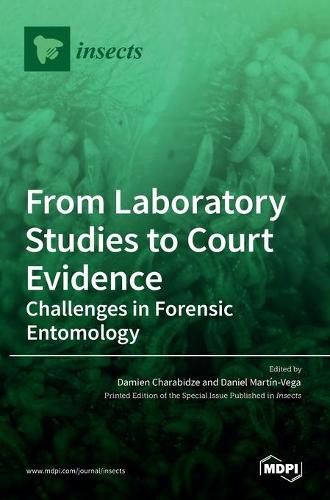Readings Newsletter
Become a Readings Member to make your shopping experience even easier.
Sign in or sign up for free!
You’re not far away from qualifying for FREE standard shipping within Australia
You’ve qualified for FREE standard shipping within Australia
The cart is loading…






This title is printed to order. This book may have been self-published. If so, we cannot guarantee the quality of the content. In the main most books will have gone through the editing process however some may not. We therefore suggest that you be aware of this before ordering this book. If in doubt check either the author or publisher’s details as we are unable to accept any returns unless they are faulty. Please contact us if you have any questions.
In 2001, Benecke concluded a review on the history of forensic entomology with these optimistic words: basic research and advanced application of forensic entomology (…)has opened the way to routine casework . At the same time, the TV show Crime Scene Investigation (CSI) largely brought forensic entomology to light. However, the show also cruelly pointed out its limits: After the team leader explained to his colleague how insects
can help determine the time of death, the team leader added You’ve still got to convince a jury , to which the colleague promptly responded On guns. It’s got to be better than bugs. Less Latin. Indeed, several factors-including complexity, inherent limitations, and the rapid evolution of scientific knowledge-explain the slow acceptance of insect-based evidence. In this context, this Special Issue focuses on the articulation between laboratory studies and casework, a major challenge for the future of forensic entomology.
$9.00 standard shipping within Australia
FREE standard shipping within Australia for orders over $100.00
Express & International shipping calculated at checkout
Stock availability can be subject to change without notice. We recommend calling the shop or contacting our online team to check availability of low stock items. Please see our Shopping Online page for more details.
This title is printed to order. This book may have been self-published. If so, we cannot guarantee the quality of the content. In the main most books will have gone through the editing process however some may not. We therefore suggest that you be aware of this before ordering this book. If in doubt check either the author or publisher’s details as we are unable to accept any returns unless they are faulty. Please contact us if you have any questions.
In 2001, Benecke concluded a review on the history of forensic entomology with these optimistic words: basic research and advanced application of forensic entomology (…)has opened the way to routine casework . At the same time, the TV show Crime Scene Investigation (CSI) largely brought forensic entomology to light. However, the show also cruelly pointed out its limits: After the team leader explained to his colleague how insects
can help determine the time of death, the team leader added You’ve still got to convince a jury , to which the colleague promptly responded On guns. It’s got to be better than bugs. Less Latin. Indeed, several factors-including complexity, inherent limitations, and the rapid evolution of scientific knowledge-explain the slow acceptance of insect-based evidence. In this context, this Special Issue focuses on the articulation between laboratory studies and casework, a major challenge for the future of forensic entomology.